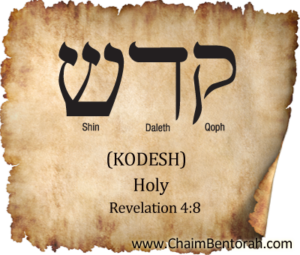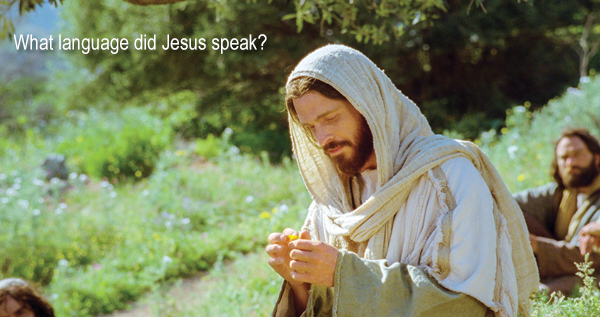Aramaic Word Study – Holy Kodesh Qop Daleth Shin
Revelation 4:8: “Each of the four living creatures had six wings and was covered with eyes all around, even under its wings. Day and night they never stop saying: “Holy, holy, holy is the Lord God Almighty,’ who was, and is, and is to come.”
“ Holy, holy, holy is the Lord God Almighty,’ who was, and is, and is to come.” Wow! Meditate on that for a while and you begin to understand what these living creatures were so excited about.
 For many of us, the word holy indicates something belonging to God, something supernatural, otherworldly. It is something that is just outside the norms of our everyday life. The English word is rooted in the word “wholly” which means to be completely, totally fully, utterly, perfectly, and entirely. When used with our understanding of holy it suggests something or someone entirely devoted or dedicated to God, down to the very hairs of one’s chinny chin chin.
For many of us, the word holy indicates something belonging to God, something supernatural, otherworldly. It is something that is just outside the norms of our everyday life. The English word is rooted in the word “wholly” which means to be completely, totally fully, utterly, perfectly, and entirely. When used with our understanding of holy it suggests something or someone entirely devoted or dedicated to God, down to the very hairs of one’s chinny chin chin.
The word in Aramaic for holy is identical to the Hebrew word kodesh. We find the word kodesh throughout the Old Testament, particularly in relation to the laws of the Temple and all that “holy” stuff in the temple. In the New Testament we find it in the Lord’s Prayer in Matthew 6:9 where Jesus instructs us to say; “Our Father who art in heaven Hallow be thy Name.” The word hallow in Aramaic is kodesh which is “Holy is thy Name.” We further find it in the Book of Revelation as in our study verse where the living creatures cry Holy three times over and over. Imagine that, these living creatures are day and night repeating the words holy, holy, holy over and over for eons. You would think they would grow absolutely bored and tired of it. Apparently, the holiness of God is something so startling and magnificent that they never tire of repeating “Holy, holy, holy is the Lord God Almighty.” The more you say it the more awed you are. The magnificence of God is infinite and we will spend eternity just being awed by God.
In Semitic languages and culture when you repeat something three times you are speaking of the ultimate, the fullness of something. When one bargain with a Middle Eastern merchant the buyer will ask how much is the item. The merchant will give a price and the buyer will suggest another price and the merchant will then counter with a further price. The third price mentioned usually becomes the agreed price. That is what is called in negotiations your “walk away” price. That is as low as you will go on the price. In other words, when the buyer suggests a lower price he is saying: “I want to know your lowest or ultimate price.” So when these created beings cry holy three times they are declaring that God is the ultimate in holiness.
But holiness or kodesh is not just applying to divine and spiritual matters alone. Holiness can apply to ordinary events and stuff of life. It is managing the realities of our everyday life in a holy manner.
The Hebrew word kodesh means “separated.” But that is a separation in the sense of removing impurities and unwanted elements from an object or from one’s life and existence. Holiness is a refining process. I watched a documentary about a man who purchased the rights to an abandoned gold mine. He did not even enter the mine. Instead, he rented a back loader and loaded tons of ore and debris that was removed by the former gold miners and tossed in piles outside the mine. If you pick up the pieces of rocks and stone and examine them with the naked eye, you will likely so no gold at all. Yet within that ton of debris, there is embedded throughout that ore minute specks of gold. The man then took tons of ore and debris to his homemade refinery where he separated and filtered out the debris. He then refined it further in a fire separating the dross from the pure gold. When concluded he had from a ton of rocks about .0005 ounces of pure refined gold the size of a quarter. You can do the math. With gold averaging around $1,800 an ounce, that old boy made himself about a dollar’s worth of gold. That was the kodesh the holy, holy, holy of a ton of ore and debris that the previous gold miners tossed aside as it was not worth their effort to extract those minute specks of gold. The only thing that made that ore valuable to that miner was the one dollar’s worth of gold embedded in it. That one dollar’s worth of gold from a ton of debris was the holy, holy, holy.
God is the pure kodesh, the holy, holy, holy. He is found in every aspect of our daily lives. Our mission is to be “kodesh miners.” In our everyday life, we take that ton of ore from all the events of our lives, it’s joys and sorrows, seemingly random acts of kindness or despair and mine it, refine it, process it, filter it, and even put it through the fires to extract every speck of gold and mold it into the holy, holy, holy. His Holiness is that little piece of refined gold. We extract from the many little, almost unnoticeable specks scattered throughout our daily life to discover the pure gold of God. Our mission is to take that ton of debris and ore of life and refine, filter it, and burn away all the impurities until we have separated all those gold specks into a kodesh, that holy, holy holy piece of pure gold.
That unreasonable demand from your boss, that driver who tailgates you because you are moving too slow, and that person who curses you out, all have a little, minute spark of kodesh that you need to mine out, filter and refine. You need to separate out of the impurities of greed, pride, and selfishness to discover your gratitude to God and his kodesh.
I have lived in silence and grew close to God during my time of silence when I just dropped off the grid and spent 24/7 with God. But I found that if I mine through the ton of ore in my daily life and refine away all the impurities of this world I will discover the holy, holy, holy, and at the end of the day I am as close to God as I was when I was living in silence. In fact, I may find myself even closer to God.
We are not called to holiness we are called to discover kodesh, the holy, holy, holy.
Hi there! Thank you for reading this Daily Word Study. Can I ask a favor? Share this Daily Word Study with your friends on Facebook and Twitter by clicking one of the icons below.
Thanks & Blessings, it means a lot to me!








Shalom, and thank you Chaim for helping us to better understand the word kodesh. And the process of refining our day, so we can discovering the golden treasures God has embedded in each day. We can view this as a wonderful adventure; a treasure hunt, and at the end of our day. “We can present our treasurer’s to our Lord and thank Him for the refining process and the golden gift’s He has given to us”. Corey Ten Boom, paraphrased.
Good morning, does Chaim have a study on the Finger of God or Hand of God? Is it possible to get me an answer by Friday? In our Bible Study we are in Daniel 5 with the message written on the wall to Belshazzar. The Finger of God wrote the Ten Commandments on the tablets of stone and Jesus wrote in the dirt with the woman taken in Adultery. I’d like to gain a deeper understanding of this. Thank you
I want to do whatever it takes, no matter how hard it is to become whatever God has destined me to become.
Wow…. I know I am still not able to fully understand all of this…. But…. I do believe I understand more than I did before reading this. Now I am catching myself drawing off into a daydream about His Holiness and the awesome awareness of His power. No words For it.
Magnificent perspective.
Thank you